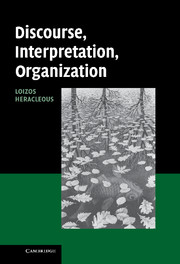Book contents
- Frontmatter
- Contents
- List of figures
- List of tables
- Preface
- 1 Images of discourse: interpretive, functional, critical, and structurational
- 2 Interpretive approaches to organizational discourse
- 3 Functional approaches: metaphor in organization change and development
- 4 Critical approaches: Michel Foucault's conceptions of discourse
- 5 A structurational approach to discourse
- 6 Analyzing discourse I: discourse as situated symbolic action
- 7 Analyzing discourse II: a tale of three discourses
- Index
- References
4 - Critical approaches: Michel Foucault's conceptions of discourse
Published online by Cambridge University Press: 22 September 2009
- Frontmatter
- Contents
- List of figures
- List of tables
- Preface
- 1 Images of discourse: interpretive, functional, critical, and structurational
- 2 Interpretive approaches to organizational discourse
- 3 Functional approaches: metaphor in organization change and development
- 4 Critical approaches: Michel Foucault's conceptions of discourse
- 5 A structurational approach to discourse
- 6 Analyzing discourse I: discourse as situated symbolic action
- 7 Analyzing discourse II: a tale of three discourses
- Index
- References
Summary
As discussed in chapter 1, critical approaches view discursive social reality construction as imbued with power and interest considerations, where dominant groups attempt to shape reality, social practices, and even subjects' identities in ways that perpetuate these groups' own interests. Far from being neutral, language-based constructs, discourses are seen as the sites of polyphonic struggles as domains of power–knowledge relations that can dominate subjectivity in favor of the already powerful. The politically motivated task of critical discourse analysis is thus to demystify and expose the processes involved and ideally weaken their grip.
Michel Foucault has been a key figure providing inspiration, concepts, and analytical frameworks for critical discourse scholars. This chapter traces the development of Foucault's concept(s) of discourse from the Archaeological to the Genealogical periods, significantly drawing from Foucault's own texts. Second, it offers a critique of Archaeological conceptions of discourse, focusing on the discourse–subject relationship, and on Foucault's related conceptions of change, choice, and rules of discursive formations. Third, it traces Foucault's conceptual shifts and concerns in his Genealogical period, in particular his views on power, discourse as a manifestation of the will to power, and a tacit acceptance of the importance of agency. Finally, implications for organizational discourse analysis are discussed.
Critiques of Foucault's discussions of discourse have received much attention in philosophy (Frank, 1992; Habermas, 1987), literature (Kermode, 1973; Said, 1974), sociology (Brown and Cousins, 1994; Freundlieb, 1994), and organization studies (Newton, 1994, 1998; Reed, 1998).
Information
- Type
- Chapter
- Information
- Discourse, Interpretation, Organization , pp. 79 - 107Publisher: Cambridge University PressPrint publication year: 2006
References
Accessibility standard: Unknown
Why this information is here
This section outlines the accessibility features of this content - including support for screen readers, full keyboard navigation and high-contrast display options. This may not be relevant for you.Accessibility Information
- 1
- Cited by
